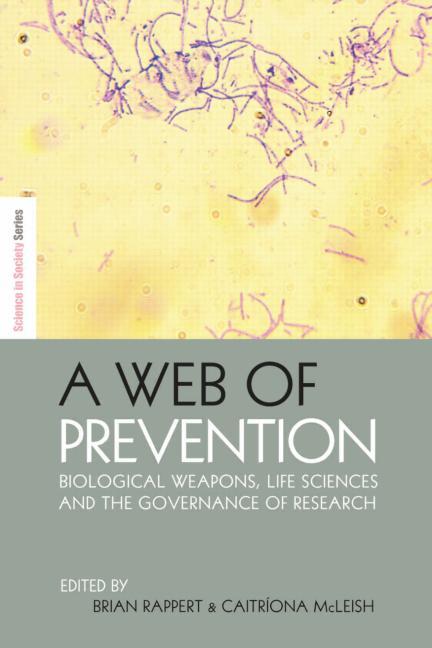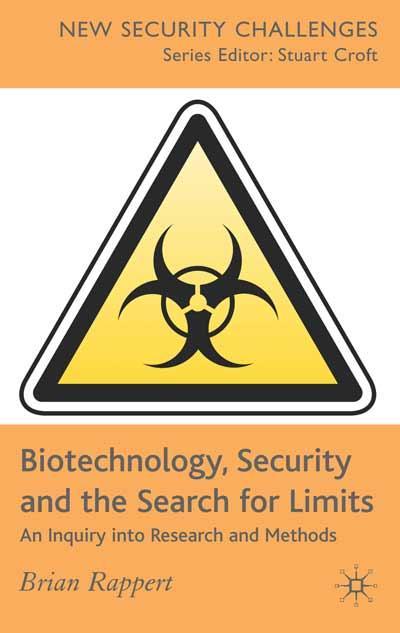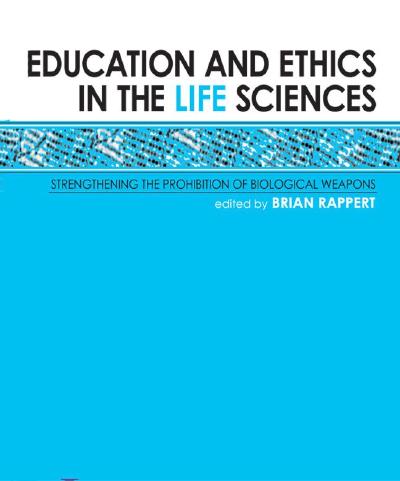 Since 11 September 2001 and the anthrax attacks that followed in the US, concerns about the security threats posed by biological weapons have increased significantly. With this has come an expansion of activities where the wisdom of applying national security controls is being considered. Questions are being asked regarding what novel threats might stem from life science research, how those associated with the life sciences can contribute to national defence, and whether controls should be placed on what gets done and how.
Since 11 September 2001 and the anthrax attacks that followed in the US, concerns about the security threats posed by biological weapons have increased significantly. With this has come an expansion of activities where the wisdom of applying national security controls is being considered. Questions are being asked regarding what novel threats might stem from life science research, how those associated with the life sciences can contribute to national defence, and whether controls should be placed on what gets done and how.
A major plank of policy responses in relation to this has been devising educational and awareness training for scientists regarding the 'dual use' potential of research — its potential to be used for both beneficent and malevolent purposes. Yet, that overall agreement is belied by the lack of specification about the content and specific aims of such provisions. Should that, for instance, consist of providing information on the history of biological warfare, stimulating generic concerns about the responsibilities of scientists today, alerting researchers to security considerations for their individual consideration, or challenging certain presumptions about the malign potential of research?
First as part of a grant funded by the Economic and Social Research Council and more recently through three Alfred P. Sloan Foundation grants, Malcolm Dando (University of Bradford) and Brian Rappert (University of Exeter) are conducting seminars for practising researchers. There are two aims to this: one, to inform participants about current biosecurity ‘dual use’ debates and second, to generate interactive discussion about the merits of proposed policy responses. Working with a wider range of individuals and organisations, we have conducted over 100 of these seminars with researchers in countries such as the UK, the US, South Africa, the Netherlands, Finland, Japan, Israel, Uganda, Ukraine, Kenya, Switzerland, Australia, Argentina, Germany, India, and Australia. With our collaborators, we are now working to build up from these activities to develop national educational provisions and policies.
Through this work we are developing a novel research method for engaging with practising scientists about emerging areas of societal discussion:
Interactive Materials
Our seminars have sought to engage practicing scientists and students in thought provoking discussions about the possible implications of their work. Rather than simply providing information, we think it is important for people to discuss these issues with one another. In the spirit of encouraging further deliberation, we have produced two educational aids:
1. NYAS eBriefing
 On 28 March 2006, we conducted a seminar at the New York Academy of Sciences. The NYAS recorded the session and produced one of its eBriefing web pages. This “No Easy Answers” eBriefing includes (signup necessary):
On 28 March 2006, we conducted a seminar at the New York Academy of Sciences. The NYAS recorded the session and produced one of its eBriefing web pages. This “No Easy Answers” eBriefing includes (signup necessary):
- The audiovisual recording of the seminar (app. time 1h 15m);
- An analysis of our reasoning for asking what we did;
- Transcribed examples of exchanges from previous seminars to illustrate contrasting responses;
- Further questions for consideration based on the NYAS conversation;
- Links to relevant web sites.
The seminar can be viewed on its own, or used in conjunction with the other elements of the eBriefing. Course instructors, for instance, can assign students to watch the seminar or do so while also responding to the further questions posed.
2. Dual Use Role Playing Simulation
To allow for course instructors to conduct these seminars, we have produced a teaching aid package. This will not only allow individuals to repeat the seminar, but also take them a step further. In collaboration with Marie Chevrier (then University of Texas at Dallas), we have turned our basic structure into a role playing game. In this exercise, participants are asked to imagine what they might say to the questions posed if they were a first year postdoc, a senior professor, a police officer, a scientific reporter, and so forth. An advantage of such role playing is that it challenges people to think, respond and listen in ways that they might not otherwise.
This role play playing package consists of three parts:
- A set of projector slides and presentation notes, with elaborating info and links,
- Role instructions for 16 different participants, and
- A background teaching note.
 In terms of time requirements, this seminar could be run as part of a 1.5 hour course or otherwise split up.
In terms of time requirements, this seminar could be run as part of a 1.5 hour course or otherwise split up.
Biosecurity & Dual-Use Education: Links to other resources
In recent years, a number of initiatives have been undertaken pertinent to dual use and biosecurity education:
- As part of its Biotechnology, Weapons and Humanity appeal, the International Committee of the Red Cross has produced a document titled Preventing Hostile Use of the Life Sciences: From Ethics and Law to Best Practice, to provide principles to promote awareness of the humanitarian norms against the hostile use of the life sciences.
- The Institute on Global Conflict and Cooperation within the University of California ran a two week summer course (2004—2009) for graduate students and junior professionals examining the threat of bioterrorism.
- The World Health Organization has issues laboratory guidance for biosecurity titled Biorisk Management: Laboratory Biosecurity Guidance.
- Sandia National Laboratories in the US has an International Biological Threat Reduction program intended for practitioners in the life sciences aimed at minimizing biological risks from research.
- The Center for Arms Control and Non-Proliferation produced an online educational program titled Biosecurity: Risks, Responses, and Responsibilities.
- The Southeast Regional Center of Excellence for Biodefense and Emerging Infections (SECREB) has established an online module ("The Dual-Use Dilemma in Biological Research") intended for those engaged in biological research.
- The Federation of American Scientists has produced a series of on-line educational modules designed to increase awareness of biosecurity and promote enhanced self-regulation by scientists.
- The Stockholm International Peace Research Institute, the Free University Brussels, and the International Relations and Security Network have developed an education module about the non-proliferation of chemical and biological weapons.
- The Nuclear Threat Initiative has compiled a International Union of Pure and Applied Chemistry of university and institute courses taught with material relevant to the problem of biological weapons.
- Middlebury College convened a fourth annual workshop for those studying nuclear, chemical and biological weapons to develop curriculum and course syllabus with special respect to non-proliferation, in May 2006.
- The American Association for the Advancement of Science has created a web resource related to ‘dual use' issues in the life sciences.
- In relation to chemical weapons, the International Union of Pure and Applied Chemistry commissioned an educational web site in 2007 about the multiple uses of chemistry.
Online Publications Related to Education Engagements with the Life Sciences
- Bezuidenhout, L. and B. Rappert. 2012. The Ethical Issues of Dual-Use and the Life Sciences. CORE Issues in Professional and Research Ethics, August.
- Rappert, B. (ed) 2010. Education and Ethics in the Life Sciences: Strengthening the Prohibition of Biological Weapons. Canberra: Australian National University E Press. (OpenAccess PDF.)
- Rappert, B. 2008. The Benefits, Risks, and Threats of Biotechnology. Science & Public Policy February 35(1): 37-44.
- Rappert, B. 2007. Biotechnology, Security and the Search for Limits: An Inquiry into Research and Methods. London: Palgrave. Read the introduction here.
- Gould, C., T. Egwang, and B. Rappert 2007. Africa Must Commit to Biosecurity Measures. SciDev.Net 16 August 2007.
- Rappert, B. and C. McLeish. (eds) 2007. A Web of Prevention: Biological Weapons, Life Sciences and the Future Governance of Research. London: Earthscan. Read the introduction here.
- Rappert, B. 2007. ‘Education for the Life Sciences’ In: A Web of Prevention: Biological Weapons, Life Sciences and the Future Governance of Research. London: Earthscan.
- Rappert, B., M. Chevrier and M. Dando. 2006. In-Depth Implementation Publications of the BTWC: Education and Outreach. Bradford Review Conference Paper No. 18.
- Rappert, B. 2006. The Life Sciences, Biosecurity, and Dual-Use Research. Conference Proceedings to the 10th PIIC Beijing Seminar on International Security 25-28 September.
- Dando, M. and B. Rappert. 2005. Codes of Conduct for the Life Sciences: Some Insights from UK Academia. Bradford Briefing Paper No. 16 (2nd Series), May.